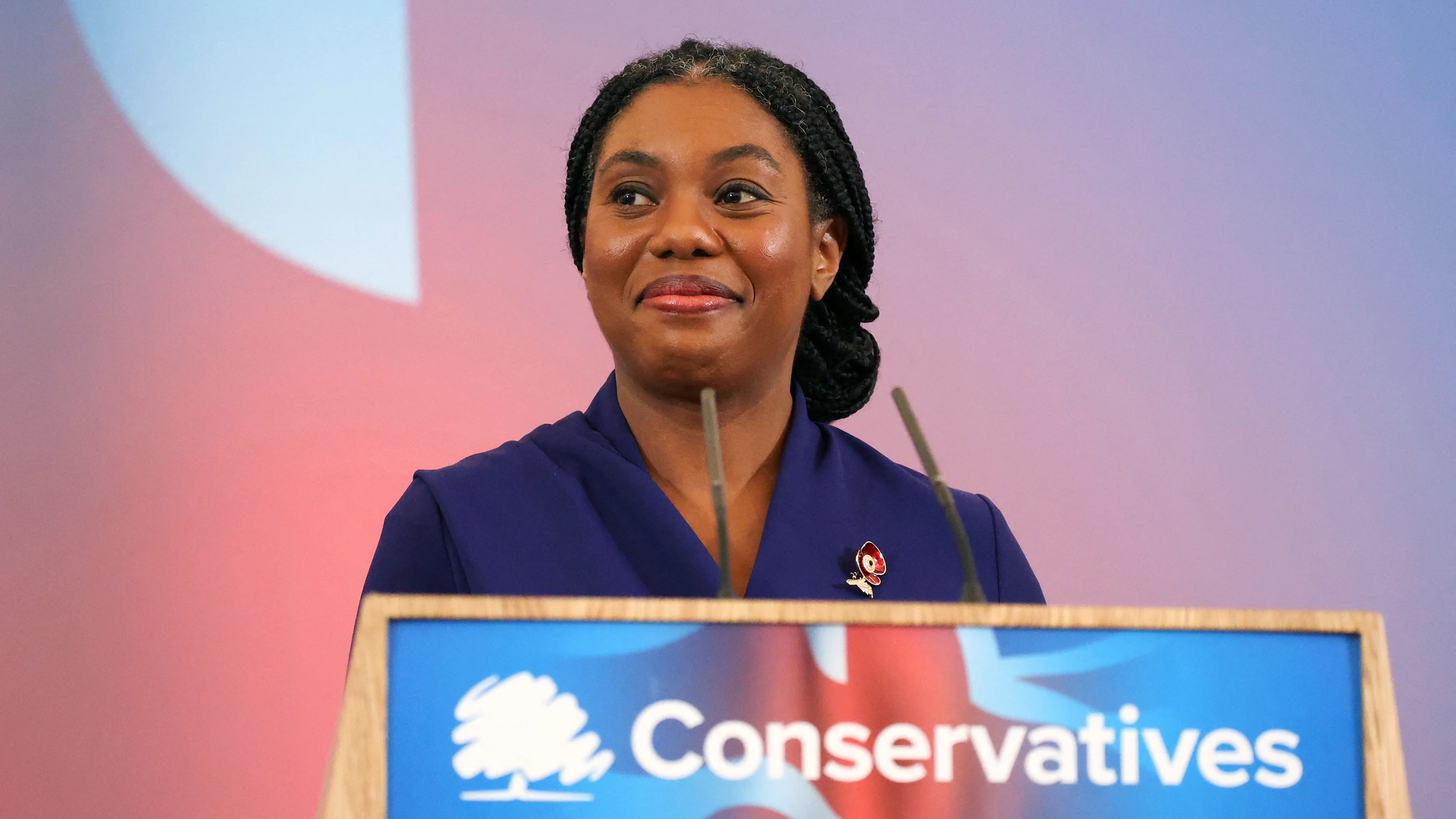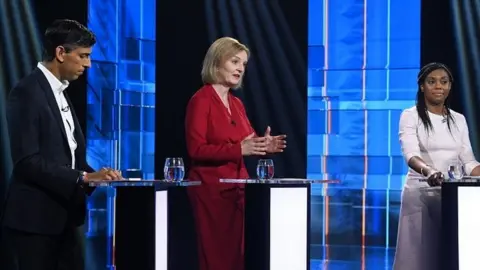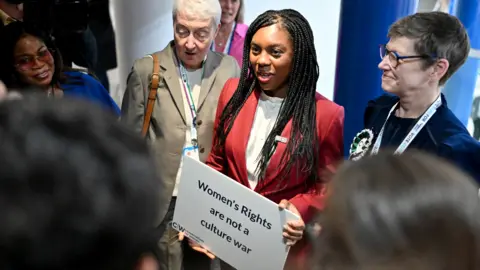Kemi Badenoch: Who is new Tory leader and what does she stand for?

Like her political heroine Margaret Thatcher, Kemi Badenoch - who is the new Conservative leader - divides opinion even within her own party.
Her robust views, "anti-woke" values and no-nonsense style have made her a darling of the Conservative right and the party's grassroots and they have chosen her over fellow right-winger Robert Jenrick.
As the first black woman to lead a major UK political party she has made history, but she is no fan of identity politics and is not likely to make much of that as she sets to work on the formidable task of restoring her party's battered fortunes.
The former business secretary's analysis of what went wrong for the Conservatives at the general election is that they "talked right, but governed left", and need to "stop acting like Labour" to win back power.
It is a pledge she put at the heart of her Tory leadership campaign, which focused on changing the underlying mindset of the British state rather than setting out detailed policies.
Born in Wimbledon in 1980, Olukemi Adegoke was one of three children of Nigerian parents. Her father worked as a GP and her mother was a physiology professor.
Badenoch - she married banker Hamish Badenoch in 2012 and they have three children - grew up in Lagos, Nigeria, and in the United States where her mother lectured.
She returned to the UK at the age of 16 to live with a friend of her mother because of the worsening political and economic situation in Nigeria, and studied for her A-levels at a college in south London while working in a McDonald's restaurant and elsewhere.
After completing a degree in computer engineering at Sussex University, she worked in IT while also gaining a second degree in law.
She then moved into finance, becoming an associate director of private bank Coutts and later worked as the digital director of influential Conservative-supporting magazine The Spectator, a non-editorial role.
According to Blue Ambition, a biography written by Conservative peer Lord Ashcroft, it was at Sussex University that Badenoch got a taste for right-wing politics - becoming "radicalised" by the left-wing campus culture, in the opposite direction.
She later described student activists there as the "spoiled, entitled, privileged metropolitan elite-in-training".
Badenoch joined the Conservative Party in 2005 - aged 25 - and stood unsuccessfully for Parliament in 2010 and the London Assembly in 2012.
When two Tory Assembly members, including Suella Braverman, were elected MPs in 2015, she took a vacant Assembly seat.
She backed Brexit in the 2016 referendum before achieving her ambition of becoming an MP a year later, for the safe Conservative seat of Saffron Walden in Essex.

Badenoch had spent three years bouncing around junior government roles when in 2022 she joined the rapid ministerial exodus which brought down Boris Johnson.
To the surprise of many of her colleagues, Badenoch then joined the sprawling contest to succeed Johnson despite never having been in the cabinet.
What began as a longshot campaign with the support mostly of loyal friends who also entered Parliament in 2017 quickly gained momentum, and heavyweight support in the form of Michael Gove.
Badenoch ultimately came fourth with the backing of 59 MPs - more than the 42 MPs who were enough for her to finish top in the parliamentary stage of the current leadership election.
Her direct approach, instructing her colleagues to “tell the truth”, won Badenoch a bigger role in the Conservative Party and it was inevitable that Liz Truss chose to appoint her to the cabinet - making her international trade secretary.
Rishi Sunak retained her in post, adding the business and women and equalities briefs.
Her time in Parliament has been characterised by her straightforwardness and willingness to engage in controversial issues.
As a junior equalities minister under Johnson, she enraged many on the left when she challenged the notion there was widespread institutional racism in Britain.
In an LBC interview, she said she had experienced prejudice only from left-wingers.
"I came to this country aged 16 and now I am standing for prime minister - isn't that amazing? I was born in this country but I didn't grow up here.
"I don't understand why people want to ignore all of the good things and only focus on the bad things, and use the bad things to tell the story," she added.
She calls herself a gender-critical feminist, and has been an outspoken opponent of moves to allow self-certification of transgender identity.
As the cabinet minister in charge of women and equalities, she spearheaded the UK government's blocking of Scotland's Gender Recognition Reform Bill.
Responding to the Cass report on gender identity services in the NHS, she said they had been "hijacked by ideologues" while critics were "gagged", resulting in children being harmed.
She has also opposed gender-neutral toilets.
In 2021, members of the government's own LGBT+ advisory panel urged her to "consider her position" over the failure to deliver a manifesto pledge to ban so-called conversion therapy.
 Getty Images
Getty ImagesBadenoch is often labelled a "culture warrior" but she disputes the tag.
Sometimes accused of wanting to start a fight in an empty room, she says she does not like to fight - but is prepared to fight to defend Conservative principles.
That is simultaneously what endears her to Conservative MPs and what makes some of them anxious.
During the early stages of the leadership election several Conservative MPs told the BBC they were inclined to support Badenoch but were put off by fractious interactions while she was in government.
To her supporters, that’s the point: unlike other ministers she was willing to tell MPs what she believed and make the case for it forthrightly.
On the eve of this year's party conference in Birmingham, she made headlines with a claim that not all cultures were "equally valid", citing as an example "cultures where women are told that they should not work".
She also got attention in Birmingham for quipping that 5-10% of civil servants were so bad they should be in prison. She has previously strongly denied bullying officials.
But she backtracked after an interview in which she appeared to suggest the current level of maternity pay was "excessive". She claimed her words had been "misrepresented", saying she had been talking about excessive business regulation and maternity pay was "a good thing".
In 2018, Badenoch admitted that, a decade earlier, she had hacked into the website of then-Commons leader and deputy Labour leader Harriet Harman as a prank. Harman accepted her apology.
Among public spats, in February, she accused the Post Office chair she had sacked of seeking "revenge" by "making up" claims he been told to delay compensation payments for sub-postmasters affected by the Horizon IT scandal.
Henry Staunton said he had been told to stall pay-outs to allow the government to "limp into the election", apparently to ease the public finances.
Conservatism 'in crisis'
Nor has Badenoch shied away from public clashes with MPs on her own side - including when she rejected calls to make it illegal to discriminate against people going through the menopause.
Appearing before a Commons committee, she told chair Caroline Nokes "loads of people" wanted to use equalities law as "a tool for different personal agendas and interests".
During her leadership campaign, Badenoch has spoken of Conservatism being "in crisis" - under attack from a new "progressive ideology" involving "identity politics" (politics based on a particular identity such as race, religion or gender), constant state intervention, and "the idea that bureaucrats make better decisions than individuals" or elected politicians.
Despite the Tories being in office for 14 years, she argues that increases in government regulations and public spending have crippled economic growth and polarised the country.
She rejected Robert Jenrick's call for key party policies to be settled now, saying the UK's "system is broken" and requires a reset.
The Conservative Party, she adds, needs to return to its core values and come up with new policies that recognise this reality.
Source: BBC
























































